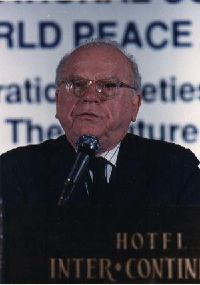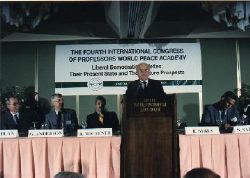Edward Shils
| Western Philosophy 20th-century philosophy | |
|---|---|
 | |
| Name: Edward Albert Shils | |
| Birth: July 1 1910 Springfield, Massachusetts [1][2] | |
| Death: January 23 1995 (aged 84) Chicago | |
| School/tradition: | |
| Main interests | |
| sociology, social philosophy | |
| Notable ideas | |
| Role of intellectuals in society | |
| Influences | Influenced |
| Max Weber, Louis Wirth, Talcott Parsons | Talcott Parsons, Saul Bellow, Joseph Epstein, Jerzy Zubrzycki |
Edward Albert Shils (July 1, 1910 – January 23, 1995) was a Distinguished Service Professor in the Committee on Social Thought and in Sociology at the University of Chicago and an influential sociologist. He was known for his research on the role of intellectuals and their relations to power and public policy. His work was honored in 1983 when he was awarded the Balzan Prize. In 1979, he was selected by the National Council on the Humanities to give the Jefferson Lecture, the highest award given by the U.S. federal government for distinguished intellectual achievement in the humanities.
Life
Edward Shils was born on July 1, 1910 in Springfield, Massachusetts.[2] He grew up in Philadelphia, where he went to high school. While still in high school he became fascinated by the works of German sociologist Max Weber, an interest that continued throughout his career.
His undergraduate degree, awarded from the University of Pennsylvania in 1931, was in French literature. He worked as a social worker prior to beginning his career in sociology at the University of Chicago.
Shils married historian Irene Coltman in England in December, 1951.[3] They had one son, Adam. Shils later divorced Irene.
Edward Shils died on January 23, 1995 at his home in Chicago, at the age of 84. He was survived by his son and daughter-in-law, Adam and Carrie Shils of Chicago; a grandson, Sam Shils; and a nephew, Edward Benjamin Shils, professor emeritus at the University of Pennsylvania[4]
Work
Shils came to the attention of Louis Wirth, a distinguished sociologist at the University of Chicago, who hired him as a research assistant. Thereafter, Shils became recognized as an outstanding teacher in the field of sociology. His knowledge of the literatures of numerous cultures and fields was deemed to be impressive. He taught sociology, social philosophy, social thought, and other subjects although he did not have a formal degree in those fields.
He served with the British Army and the United States Office of Strategic Services during World War II. Upon returning to Chicago, he was appointed Associate Professor in 1947, and Professor in 1950. In 1953 he received a joint appointment to the Committee on Social Thought, an interdisciplinary program founded in 1941, and to the Department of Sociology. In 1971, he was named Distinguished Service Professor where remained, teaching until his death in 1995.
Shils became well known for his research on the role of intellectuals and their relations to power and public policy. A specialist in the works of Max Weber, he also translated the works of sociologist Karl Mannheim into English. His study of the German sociologists, such as Weber, Simmel, and Mannheim, as well as his interactions with colleagues in Chicago, led him to formulate novel ways of thinking about social groups and the role played by scholars and scholarship in human affairs.
For many years, Shils held joint appointments at Chicago and other universities. He was reader in sociology at the London School of Economics from 1946 to 1950; a fellow of King's College, Cambridge, from 1961 to 1970; a fellow of Peterhouse, Cambridge, from 1970 to 1978; and an honorary professor in social anthropology at the University of London from 1971 to 1977. He was named an honorary fellow at the London School of Economics in 1972 and an honorary fellow at Peterhouse in 1979. He was also a professor at the University of Leiden from 1976 to 1977.
Shils made consistent efforts to bridge the research traditions of German and American sociology. At Chicago, he attracted leading European scholars to teach at the University, including Arnaldo Momigliano, Raymond Aron and the British sinologist Michael Loewe, among others. Professor Shils was a member of the American Academy of Arts and Sciences and the American Philosophical Society. In 1989, he chaired the Fourth International Congress of PWPA (Professors World Peace Academy) held in London. In his presentation he drew attention to the distinction between the "civil person" and the "civil society" as compared to the "citizen" and the "state," pointing to conditions that threaten to erode civility and endanger liberal democracy.
Legacy
In 1979, Edward Shils was selected by the National Council on the Humanities to give the Jefferson Lecture, the highest award given by the U.S. federal government for distinguished intellectual achievement in the humanities.[5] His work was honored in 1983 when he was awarded the Balzan Prize.
Shils was the founder and editor of Minerva: A Review of Science, Learning and Policy, the world's leading journal of the social, administrative, political, and economic problems of science and scholarship. He also was a co-founder of the Bulletin of the Atomic Scientists.
Considered an "academic of renown in his own time,"[6] after his death, Shils was lauded by numerous colleagues for his scholarship: "He was a scholar of the highest eminence. ... He made great contributions to all the humanistic sciences" (Sir Hugh Lloyd-Jones, former professor of Greek at Oxford University). According to The Times Higher Education Supplement:
He is essentially an intellectual's intellectual and scarcely a single corner of the Western cultural tradition has not benefited from the illumination afforded by his penetrating and often pungent attention.[7]
He was known as a formidable force in the University of Chicago's Committee on Social Thought, and an exacting dissertation advisor:
If you wrote a dissertation under Edward, you were sent to the south of England, thence to Sumatra and back, but when you were done, you really knew everything about your subject. Many a student must have left his apartment, heart weighted down with a list of another thirty tomes he would have to plough through and head spinning from having discovered that, to take the next logical step in his studies, he would have to learn Polish.[8]
His students learned many things from Shils, including how best to peel an orange:
One begins by cutting off both ends of the orange. One then cuts roughly six segments in the jacket. Then one strips away, easily enough, the jacket segments. ... Like the Shils method for writing a dissertation, it appears at first the long way round, but the reward comes in the satisfaction one feels at project's end.[8]
A large photo of Shils hangs in the Shils Reading Room at the University of Chicago's Social Science Research Building, a reminder of his many years of service to that educational institution, fittingly present where subsequent generations of scholars can at least glimpse the vast knowledge he had gained through his reading.
Major Works
- Toward a General Theory of Action. with Talcott Parsons. Harvard University Press, 1951.
- The Torment of Secrecy: The Background and Consequences of American Security Policies. The Free Press, 1956.
- The Intellectual Between Tradition and Modernity: The Indian Situation. Mouton, 1961.
- Theories of Society: Foundations of Modern Sociological Theory. with Talcott Parsons, Kaspar D. Naegele, and Jesse R. Pitts. The Free Press, 1961.
- The Constitution of Society. University of Chicago Press, 1972.
- The Intellectuals and the Powers, and Other Essays (Selected Papers Volume 1). University of Chicago Press, 1972.
- Center and Periphery: Essays in Macro-sociology (Selected Papers Volume 2). University of Chicago Press, 1975.
- The Calling of Sociology and Other Essays on the Pursuit of Learning (Selected Papers Volume 3). University of Chicago Press, 1980.
- Tradition. University of Chicago Press, 1981.
- The Calling of Education: "The Academic Ethic" and Other Essays on Higher Education. The University of Chicago Press, 1997.
- The Virtue of Civility: Selected Essays on Liberalism, Tradition, and Civil Society. Liberty Fund Inc., 1997.
- Order of Learning: Essays on the Contemporary University. Transaction Publishers, 1997.
- Portraits: A Gallery of Intellectuals. Joseph Epstein (ed.). University of Chicago Press, 1997.
- A Fragment of a Sociological Autobiography: The History of My Pursuit of a Few Ideas. Transaction Publishers, 2006.
Notes
- ↑ Edward Shils at the Leiden University "faculty since 1575" site. Retrieved November 11, 2020.
- ↑ 2.0 2.1 Edward Shils: Bio-bibliography International Balzan Prize Foundation. Retrieved November 11, 2020.
- ↑ Marriages Dec 1951 FreeBMD. Retrieved November 11, 2020.
- ↑ Service for Edward Shils, Chicago Chronicle, March 30, 1995. Retrieved November 11, 2020.
- ↑ Government and the Universities in the United States Jefferson Lecture in the Humanities, 1979, National Endowment for the Humanities. Retrieved November 11, 2020.
- ↑ Joseph Epstein, Remembering Edward Shils Commentary, October 2019. Retrieved November 13, 2020.
- ↑ Obituary: Edward Shils, Committee on Social Thought, Sociology Chicago Chronicle 14(11) (February 2, 1995). Retrieved November 12, 2020.
- ↑ 8.0 8.1 Editor's Notes The University of Chicago Magazine, June 1997. Retrieved November 12, 2020.
ReferencesISBN links support NWE through referral fees
- Adair-Toteff, Christopher, and Stephen Turner (eds.). The Calling of Social Thought: Rediscovering the work of Edward Shils. Manchester University Press, 2019. ISBN 978-1526120052
- Ben-David, Joseph, and Terry N. Clark. Culture and Its Creators: Essays in Honor of Edward Shils. University of Chicago Press, 1977. ISBN 978-0226042220
External links
All links retrieved
- Obituary: Edward Shils, Committee on Social Thought, Sociology Chicago Chronicle, February 2, 1995.
- In memoriam: Edward Shils, 1910-1995 by H.R. Trevor-Roper, The New Criterion.
- Editor's Notes re Shils University of Chicago Magazine, June 1997.
- Edward Shils International Balzan Prize Foundation.
- Remembering Edward Shils by Joseph Epstein, Commentary, October, 2019 .
- The John U. Nef Committee on Social Thought The University of Chicago.
Credits
New World Encyclopedia writers and editors rewrote and completed the Wikipedia article in accordance with New World Encyclopedia standards. This article abides by terms of the Creative Commons CC-by-sa 3.0 License (CC-by-sa), which may be used and disseminated with proper attribution. Credit is due under the terms of this license that can reference both the New World Encyclopedia contributors and the selfless volunteer contributors of the Wikimedia Foundation. To cite this article click here for a list of acceptable citing formats.The history of earlier contributions by wikipedians is accessible to researchers here:
The history of this article since it was imported to New World Encyclopedia:
Note: Some restrictions may apply to use of individual images which are separately licensed.
